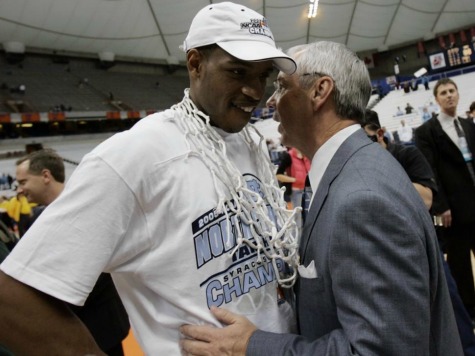A long-awaited report by former federal prosecutor Kenneth Wainstein alleges that thousands of student-athletes at the University of North Carolina took easy-A, no-show classes in the school’s African and Afro-American Studies Department (AFAM) over an 18-year period.
The UNC-authorized report notes that while athletes constitute about 4 percent of the student body at Chapel Hill they made up about half of the 3,100 students taking the phantom courses.
Wainstein and colleagues interviewed 126 people, including former Tar Heels football coaches Butch Davis and John Bunting, who confessed an awareness of classes that kept their academically at-risk players afloat but insisted they remained ignorant of the fraudulent nature of the courses. Basketball coach Roy Williams admitted concern that players disproportionately majored in AFAM but denied awareness of impropriety. The investigators failed to interview Rashad McCants, the second-leading scorer on UNC’s 2005 national championship basketball team who initially charged coach Williams with knowledge of the fraudulent scheme.
The academic fraud allegations center around longtime department chair Julius Nyang’oro and AFAM office worker Debbie Crowder, a diehard fan of the men’s basketball team who somehow oversaw courses despite a lack of credentials. “Investigation of Irregular Classes in the Department of African and Afro-American Studies at the University of North Carolina at Chapel Hill” alleges of Crowder:
Specifically, she designed and offered what are called “paper classes.” These were classes that were taught on an independent study basis for students and student-athletes whom Crowder selected. Like traditional independent studies at Chapel Hill or any other campus, these classes entailed no class attendance and required only the submission of a single research paper. Unlike traditional independent studies, however, there was no faculty member involved in managing the course and overseeing the student’s research and writing process. In fact, the students never had a single interaction with a faculty member; their only interaction was with Crowder, the Student Services Manager who was not a member of the University faculty.
The report found plagiarism in a huge percentage of AFAM papers. Despite the shoddy or meager work, students averaged a 3.62 GPA in the courses. The fraud allegedly began in the spring of 1993, the same semester the UNC basketball team won a national championship, and continued through Crowder’s retirement in 2009, the same year the Tar Heels won a third NCAA title during the period of phantom classes.
“Despite the fact that these classes involved thousands of students and coordination between Crowder and numerous University employees,” the report charges, “the Chapel Hill administration never scrutinized AFAM’s operations or the academic integrity of their course offerings.”
The report even quotes emails from academic counselors urging athletes to turn in papers to Crowder before she retired: “Debbie Crowder is retiring . . . if you would prefer that she read and grade your paper rather than Professor Nyang’oro you will need to have the paper completed before the last day of classes, Tuesday, July 21st.” The basketball team’s GPA hit a decade low upon Crowder’s departure.
The courses unsurprisingly played an integral role in keeping athletes eligible for competition.
“In the case of 329 students,” the report explains, “the grade they received in a paper class provided the ‘GPA boost’ that either kept or pushed their GPA above the 2.0 level for a semester. For 81 of those students, that GPA boost was the margin that gave them the 2.0 GPA that allowed them to graduate.”
The Wainstein Report itself serves as a way for the university to cover up its own cover up. An earlier report by former North Carolina Governor Jim Martin exonerated the school’s athletic program from malfeasance in what it dubbed a purely academic scandal.

COMMENTS
Please let us know if you're having issues with commenting.